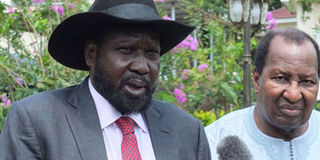Exert pressure on S. Sudan to release Kenyans jailed for life

South Sudan President Salva Kiir talks to the media on July 14, 2016 at the presidential palace in Juba. The current conflict between President Kiir and his former deputy, Dr Riek Machar, has killed and displaced hundreds of innocent civilians. PHOTO | SAMIR BOL | AFP
What you need to know:
- The government apparently has not been able to leverage enough clout to have the Kenyans released.
- Now the Kenya Human Rights Commission is suing the government for abdicating its duty to protect Kenyans abroad.
On May 29, 2015, five Kenyans, all employees of a company called Click Technologies that is owned by Mr John Agou, a relative of South Sudanese President Salva Kiir, were arrested and detained in a military facility in Juba on the grounds that they had stolen huge amounts of money from the government.
Since then, only one of the five Kenyans, Mr Peter Nkonge, has been released.
The other four, namely, Anthony Munialo, Chuma Muriuiki, Ravi Ghaghda and Anthony Wazombe, continue to be held in Juba, thanks to a kangaroo court system that has denied them access to legal representation and a fair trial.
In February last year, a judge set their bail at a ridiculous $14 million each, which none of them could realistically raise.
They were subsequently sentenced to life in prison. Meanwhile, their lawyers have been intimidated and threatened; one of them was even held at gunpoint in front of a judge and forced to drop the case.
FUTILE EFFORTS
The jailed Kenyans believe the charges against them are trumped-up and motivated by a personal rivalry between President Kiir and Mr Agou.
Ravi Ghaghda’s sister Tejal, along with the relatives of the other three Kenyans, have in the last two years been campaigning for their release, to no avail.
They have written to President Uhuru Kenyatta, the Kenyan Ministry of Foreign Affairs, Parliament, the South Sudan Human Rights Commission and the Office of the United Nations High Commissioner for Human Rights. They have held hunger strikes and vigils.
During the Inter-governmental Authority on Development summit in Nairobi, they even held a vigil outside the hotel where President Kiir was staying but were turned away by security personnel.
In July last year, there was a glimmer of hope for the Kenyans when Foreign Affairs Cabinet Secretary Amina Mohamed strongly condemned the “unbelievable and absolutely ridiculous” judgment handed out to them and stated that “there was no evidence at all adduced in court linking them to the alleged crime”.
She added then that she had instructed the Kenyan Ambassador in Juba to convey the government’s disappointment on handling of the case.
BARGAINING CHIPS
The government apparently has not been able to leverage enough clout to have the Kenyans released.
South Sudanese government officials own property in Kenya, channel their ill-gotten money through Kenyan banks and even send their children to school here.
Tejal Ghaghda believes that her brother and the three other Kenyans are being held as bargaining chips by the South Sudanese government and that “the case leaves more questions than answers”.
Now the Kenya Human Rights Commission is suing the government for abdicating its duty to protect Kenyans abroad.
The commission further argues that the detention of the four is unlawful under the Constitution, international laws and the laws of South Sudan.
Not that laws mean much in strife-torn South Sudan.
NO CREDIBLE GOVERNMENT
A new report released last month by the Enough Project describes South Sudan as “a den of thieves” and a “greed-fuelled kleptocracy” where profiteers fight over power and the corrupt spoils of war, including an “oil-fuelled gravy train”.
This particular case highlights the disappointing fact that South Sudan, which achieved a hard-fought independence through the goodwill and support of the international community, including Kenya, has been unable to form a credible government and independent institutions.
South Sudan’s leaders are more interested in acquiring personal wealth than in developing their country, restoring peace and preventing senseless bloodshed.
The current conflict between President Kiir and his former deputy, Dr Riek Machar, has killed and displaced hundreds of innocent civilians.
The country is in the grip of a man-made famine, but the government doesn’t seem to care.
MONEY LAUNDERING
Nor it seems, does the international community, which has not pushed for South Sudan’s leaders to be charged with crimes against humanity.
The Enough Project’s report says that the most promising policy approach to deal with this situation would be to combine creative anti-money laundering measures with targeted sanctions against kleptocratic South Sudanese networks.
This would include freezing the assets of those who have committed mass atrocities.
Is the Kenya Government willing to adopt such an approach, or is it held hostage by the same forces that have condemned four innocent Kenyans to life in a South Sudanese prison?





